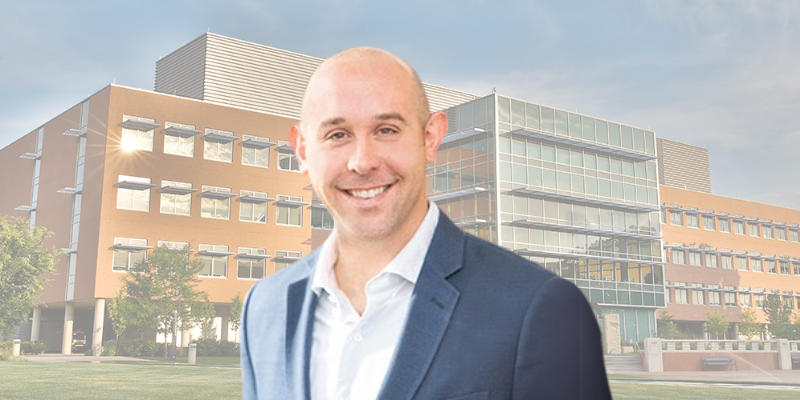In June, Governor Polis signed Senate Bill 24-048, which invests $1.5 M in establishing Recovery Friendly Workplaces (RFW) and implements a voluntary employer participation and certification program to support individuals recovering from addiction and coping with other mental and behavioral health challenges.
Leading the charge on the RFW Initiative is a partnership between the Colorado Consortium for Prescription Drug Abuse and Prevention, housed inside the Skaggs School of Pharmacy and Pharmaceutical Sciences, and the CU Anschutz Center for Health, Work & Environment in the School of Public Health. With help from an established RFW program in Connecticut, and previous funds from the Colorado state legislature, the Consortium worked with Dr. John Narine on the development of the Colorado RFW Toolkit in early 2023. These new funds, from SB 24-048, allow for engagement of businesses across the state to become recovery friendly utilizing the guidance in the toolkit.

José Esquibel speaks to a crowd at a Fentanyl awareness event. Esquibel is the Director of the Colorado Consortium for Prescription Drug Abuse Prevention at the Skaggs School of Pharmacy and Pharmaceutical Sciences. |
“As we see the further increases of access to treatment for opioid and other substance use disorders, more and more individuals in recovery are returning to the workforce and the workplace,” said José Esquibel, Director of the Colorado Consortium for Prescription Drug Abuse Prevention.
According to Esquibel, substance use and mental health disorders level a massive toll on Colorado’s economy, primarily through absenteeism, presenteeism (decreased productivity due to substance use), and underemployment. People in recovery find it difficult to re-enter the workplace, and sometimes employers don’t understand that behavioral illnesses occur due to societal causes, and that effective treatment is available.
“The establishment of the Recovery Friendly Workplace initiative in state statute provides guiding parameters for an enduring program that will help employers better support individuals in recovery to further assist them in maintaining their recovery and contributing positively to the workforce and the economy,” he said.
Participating businesses will receive training to identify workplace and workforce needs for supporting employees in treatment and recovery. This assistance includes working directly with employers to discuss workplace policies, planning workplace events that are mindful of individuals in recovery, and assisting managers and supervisors to have crucial conversations about mental health. Businesses in the healthcare, construction, hospitality, and food service industries have already pledged their support and will be early participants in the program.
The RFW certification program will be formalized beginning in July 2024. In the meantime, employers can learn about the RFW Initiative here and start by signing the RFW Pledge, receiving the Colorado RFW Toolkit, and consider joining the RFW Employer Workgroup. Interested employers can also schedule a consultation with staff of the CWHE Health Links at chwe@cuanschutz.edu.
About the Colorado Consortium for Prescription Drug Abuse and Prevention
The Colorado Consortium for Prescription Drug Abuse Prevention coordinates Colorado’s response to the opioid crisis, including the misuse of medications such as opioids, stimulants, and sedatives. The Consortium’s accomplishes this by engaging representatives of a variety of discipline related to prevention, harm reduction, treatment, recovery, and criminal justice to identify and formulate policies, promote evidence-based strategies and programs, and fostering partnerships with state agencies, professional association, community-based organizations, and community coalitions addressing one of Colorado’s major public health crises.
About the Skaggs School of Pharmacy and Pharmaceutical Sciences
The top-ranked Skaggs School of Pharmacy and Pharmaceutical Sciences on the world-class University of Colorado Anschutz Medical Campus is preparing the world's future pharmacists and pharmaceutical scientists through innovative learning and teaching. During its 110-year plus history, the School of Pharmacy has been a global leader in medical discoveries, patient care, pharmacy advocacy, and online education. CU Pharmacy is ranked in the top 10% of all pharmacy schools in the nation, producing graduates that exceed national student outcomes and enjoy stellar career opportunities. The School's faculty are advancing science and health care, through programs that reach urban and rural Coloradans, as well as communities around the world.
About the University of Colorado Anschutz Medical Campus
The University of Colorado Anschutz Medical Campus is a world-class medical destination at the forefront of transformative science, medicine, education and patient care. The campus encompasses the University of Colorado health professional schools, more than 60 centers and institutes, and two nationally ranked independent hospitals - UCHealth University of Colorado Hospital and Children's Hospital Colorado - that treat more than two million adult and pediatric patients each year. Innovative, interconnected and highly collaborative, the University of Colorado Anschutz Medical Campus delivers life-changing treatments, patient care and professional training and conducts world-renowned research fueled by over $690 million in research grants. For more information, visit www.cuanschutz.edu.


